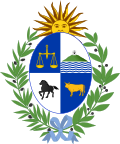
Back উরুগুয়ের ধর্মবিশ্বাস Bengali/Bangla Religión en Uruguay Spanish Religija u Urugvaju Croatian Religioni in Uruguay Italian ウルグアイの宗教 Japanese Feja në Uruguaj Albanian
- Roman Catholic (44.8%)
- Other Christian (9.5%)
- No religion (44.5%)
- Other (1.2%)
| Religion by country |
|---|
|
|
| This article is part of a series on the |
| Culture of Uruguay |
|---|
 |
|
Uruguay Portal |
|
|

Christianity is the dominant religion in Uruguay, with Roman Catholicism being its largest denomination. However, around 44.5% of the Uruguayan population is non-religious as of 2021.[2] Uruguay has no official religion, as Church and State were officially separated with the Constitution of 1918.[3] However, secularization measures had already been implemented by the 1870s.[4]
Article 5 of the Constitution of the Republic enshrines freedom of worship, thereby making any discrimination based on religion punishable by law, and obligating the government to ensure the protection of this freedom.[5] Uruguay is the most secularized country in the Americas, and despite its predominantly Christian population and deep-rooted Christian tradition, the country has undertaken significant measures to reduce the influence of religion in public life. For instance, many Christian holidays, such as Christmas and the Holy Week, are recognized as public holidays but are officially known by secular designations, such as Día de la Familia (Spanish for 'Family Day') and Semana de Turismo (Spanish for 'Tourism Week'), respectively.[6]
Aside from Christianity in its various denominations, Judaism constitutes another religion of notable presence in Uruguay, followed by Umbanda, although the latter is represented in considerably smaller numbers.[7] Other world religions such as Islam, Buddhism and Hinduism have a negligible presence in country.[8]
- ^ "Los uruguayos y la religión". 7 February 2019.
- ^ Public Opinion Uruguay, article dated 7 February 2019
- ^ US Library of Congress
- ^ "Registro de Estado Civil" (PDF). Retrieved 31 July 2024.
- ^ Iglesias Schneider, Nicolás (2013), "Religión y participación social" [Religion and social participation] (PDF), Hablando de derechos, ISBN 9789974-832701
- ^ Iacomini, Franco (2024-03-26). "How the Gaucho Stole Easter in Uruguay". Christianity Today. Retrieved 2025-02-27.
- ^ Dashefsky, Arnold; DellaPergola, Sergio; Sheskin, Ira, eds. (2019), World Jewish Population, 2019 (PDF), vol. 26, Berman Jewish DataBank
- ^ "Musulmanes en Uruguay: vivir las costumbres del islam y siguiendo las enseñanzas de Mahoma". EL PAIS (in Spanish). 2023-12-03. Retrieved 2025-02-27.
© MMXXIII Rich X Search. We shall prevail. All rights reserved. Rich X Search